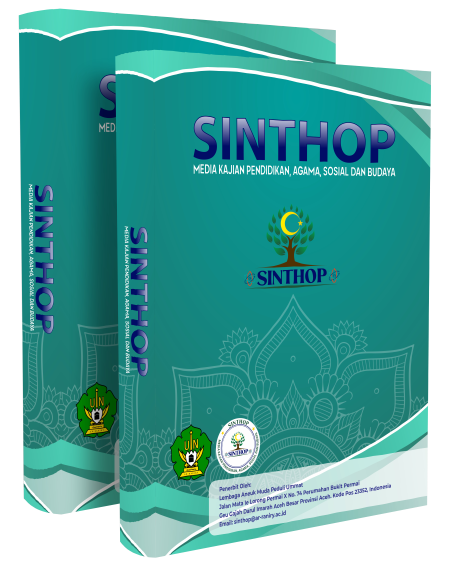The Role of Religion in Social Transformation: Challenge of Ushuluddin’s Studies in Globalization Era
Abstract
Religion has plays a major role in influencing cultures and shaping social behavior. Religion, the faith in God, with all of the spiritual wealth, can influence people and even improve them until perfection. The science of Ushuluddin studies the basics of Islamic religious beliefs (Iman), and all matters related to faith, or Tawhid. The science of monotheism is also called the science of Ushuluddin (the basics or main points of religion) or the Science of Kalam. Therefore it is called the science of Ushuluddin (the matter subject of religion). Ushuluddin has to answered the problem of the Muslim Ummah. The interpretation of Ushuluddin is how the human relationship with God and man to man to avoid inequality, the human beings should be able to put himself as a servant of God are always subjecting themselves stopper form the ritual worship. Religious education aims to help to develop the ability of thinking, to testify values and to have complete knowledge concerning the modern world, to process critical attitude for social values, in order to develop civilization within multicultural society. This research tries to analyze the impact of Religion in social transformation as a challenge of Ushuluddin’s studies of globalization.
References
Abdulla, M. R. (2018). Culture, Religion, and Freedom of Religion or Belief. The Review of Faith & International Affairs, 16(4), 102–115. https://doi.org/10.1080/15570274.2018.1535033
Beckford, A. (2003). Social Theory and Religion. Cambridge University Press.
Castells, M. (1996). The Rise of Network Society. Blackwell Publisher, Inc.
Fazal, K., & Saleh, J. (2022). Ummatan Wasaţan dalam Pancasila Perspektif Tafsir M. Quraish Shihab. TAFSE: Journal of Qur’anic Studies, 7(1), 77. https://doi.org/10.22373/tafse.v7i1.13197
Gulen, M. F. (2004). Toward a Global Civilization of Love and Tolerance. The Light, Inc.
Hausberger, M., Roche, H., Henry, S., & Visser, E. K. (2008). A review of the human–horse relationship. Applied Animal Behaviour Science, 109(1), 1–24. https://doi.org/10.1016/j.applanim.2007.04.015
Hidayat, R. (2020). Dunia dan Dīn (Agama) di Tengah Arus Globalisasi. Jurnal Studi Agama, 4(1), 35–49. https://doi.org/10.19109/jsa.v4i1.6160
Kale, S. H. (2004). Spirituality, Religion, and Globalization. Journal of Macromarketing, 24(2), 92–107. https://doi.org/10.1177/0276146704269296
Kourie, C. (2009). Spirituality and the University. Verbum et Ecclesia, 30(1). https://doi.org/10.4102/ve.v30i1.67
Liata, N., & Fazal, K. (2021). MULTIKULTURAL PERSPEKTIF SOSIOLOGIS. Abrahamic Religions: Jurnal Studi Agama-Agama, 1(2). https://doi.org/10.22373/arj.v1i2.11213
McKay, R., & Whitehouse, H. (2015). Religion and morality. Psychological Bulletin, 141(2), 447–473. https://doi.org/10.1037/a0038455
Mundakir, A. (2021). Moderasi Beragama di Tengah Cyber-Religion dan COVID-19: (Studi terhadap Mahasiswa Fakultas Ushuluddin IAIN Kudus). FIKRAH, 9(1), 165. https://doi.org/10.21043/fikrah.v9i1.9139
Nur, S. (2014). USHULUDDIN DAN GLOBALISASI: MENYONGSONG MASA DEPAN DENGAN HARAPAN. Ar-Raniry, International Journal of Islamic Studies, 1(1). https://doi.org/10.20859/jar.v1i1.5
Pizoń, J., & Gola, A. (2023). Human–Machine Relationship—Perspective and Future Roadmap for Industry 5.0 Solutions. Machines, 11(2), 203. https://doi.org/10.3390/machines11020203
Reland Kasali. (2008). Metode Metode Riset Kualitatif. Bentang Pustaka.
Ruano‐Borbalan, J. (2022). Doctoral education from its medieval foundations to today’s globalisation and standardisation. European Journal of Education, 57(3), 367–380. https://doi.org/10.1111/ejed.12522
Sumadi, T., Yetti, E., Yufiarti, Y., & Wuryani, W. (2019). Transformation of Tolerance Values (in Religion) in Early Childhood Education. JPUD - Jurnal Pendidikan Usia Dini, 13(2), 386–400. https://doi.org/10.21009/JPUD.132.13
Sutrisno Hadi. (2002). Metodelogi Research. Andi Offset.
van der Hoek, S. (2023). Globalized Religious Aftershock at the Beginning of the Twentieth Century—the Apapocúava-Guaraní Cataclysm and the 1906 San Francisco Earthquake. International Journal of Latin American Religions, 7(2), 574–588. https://doi.org/10.1007/s41603-023-00189-7
Yusuf, Y. (2023). The Role Of Pancasila In View From The Sociology Of Religion In The Globalisation Era. Journal of Business Social and Technology, 4(1), 87–97. https://doi.org/10.59261/jbt.v4i1.120
Copyright (c) 2023 Suraiya IT

This work is licensed under a Creative Commons Attribution-ShareAlike 4.0 International License.
Authors who publish in SINTHOP: Media Kajian Agama, Sosial dan Budaya agree to the following terms:
- Authors retain copyright and grant the journal right of first publication with the work simultaneously licensed Attribution-ShareAlike 4.0 International (CC BY-SA 4.0) that allows others to share the work with an acknowledgment of the work's authorship and initial publication in this journal.
- Authors are able to enter into separate, additional contractual arrangements for the non-exclusive distribution of the journal's published version of the work (e.g., post it to an institutional repository or publish it in a book), with an acknowledgment of its initial publication in this journal.
- Authors are permitted and encouraged to post their work online (e.g., in institutional repositories or on their website) prior to and during the submission process, as it can lead to productive exchanges, as well as earlier and greater citation of published work. (See The Effect of Open Acces)









.png)

.png)
.png)
.png)


